广州初一英语上海教育版上册1—4单元复习
沪教版七年级上英语各单元必考知识点汇编

沪教版七年级上英语各单元必考知识点汇编Unit1 必考知识点汇编一、Read a German girl’s blog.➢名词所有格真题链接1、(2013 ·广西贺州)Look at the man over there. He is uncleA.Jim’s and Tim’sB.Jim’s and TimC.Jim and TimD.Jim and Tim’s二、playing basketball 打篮球(教材第2页)➢零冠词用法真题链接2、(2013·山东泰安)—Do you play piano in your free time?—No, I like sports. I often play soccer with my friends.A.不填;theB.the;不填C.the; theD.a; a三、I’ from Germany.➢be from知识点真题链接3、(广西桂林中考改编题)Li Yan is my best friend. She is a small village.A.onB.withC.ofD.from四、Every day, I go to school by school bus.每天我乘校车去上学。
(教材第3页)➢by+交通工具名词的单数名词真题链接4、(2012·贵州毕节)Her mother goes to work bus every morning.A.byB.atC.onD.in五、Her hobbies 她的爱好(教材第2页)➢知识点真题链接5、(2013 江苏盐城中考)—Do you have any ?—Yes, I like chess and drama best.A.jobsB. dutiesC. hobbiesD. problems六、I like my school because the teachers are all very friendly.(教材第3页) 知识点真题链接6、(2013 湖北襄阳)—How are you getting along with your new classmates?—Very well. They are all me.A.afraid ofB. friendly toC. angry withD. sorry for七、I’m good at swimming and playing basketball.(教材第3页)➢知识点真题链接7、(2012 山东临沂)English is my favorite subject, and I am good it.A.forB.toC.atD.ofUnit1 必考知识点汇编答案解析1、【答案】D【解析】:根据上句Look at the man over there. “看那边那个男人“可知,男人只有一个,由此可以推断这个男人是两人共同的叔叔、Jim’s and Tim’s “吉姆和蒂姆各自的叔叔”。
牛津上海版七年级英语上册Unit1重点知识复习及练习

牛津上海版七年级英语上册Unit1重点知识复习及练习Part 1 U1复习词性转换1. v. 邀请cn. 邀请函,请柬____________________ 邀请某人做某事2.adj. 昂贵的cn./un. 费用_________________ 便宜的3.n. 代理人;经纪人agency n.4.n. 国家的n. 民族;国家adj. 国际的5. n. 吸引力;趣味adj. (人)对…感到有趣味的adj. (物) 有趣味的6. adj. 精彩的;令人高兴的wonder n. 奇迹v. _________7.pron. 另一(事物或人)other pron./ adj. 其它的8. n. 历史______________adj. 历史上的,实际发生过的(有关历史的事实)9. v. 升起,举起10. n. 高山,山岳11. _______________n. 假期词组默写:从…收到一封信写封信寄给我们一张照片与妈妈讨论讨论旅行在八月末颐和园长城故宫在北京的西北面用砖和石头建造在北京的中心中国历史名胜古迹有趣的地方回来邀请我们与他的家人待在一起在八月十六日看见天鹅游泳容纳2百万人一个有着很多古老建筑的地方升国旗玩的很高兴Part2形容词和副词:◆1. 形容词和副词比较级、最高级的变化规则(1).规则变化单音节词和少数双音节词,在词尾加-er,-est来构成比较级和最高级。
多音节词,加more,most构成比较级和最高级构成法原级比较级最高级一般单音节词尾加-er,-es tallgreatstrong tallergreaterstrongertallestgreateststrongest单音节以不发音的e结尾的单音词,只加-r,-st nicelargelatenicerlargerlaternicestlargestlatest词以一个辅音字母结尾的闭音节单音词,双写结尾的辅音字母再加-er,-est bighotfatbiggerhotterfatterbiggesthottestfattest双音节词以辅音字母+ y结尾的双音节词,改y为i再加-er,-esteasybusyearlyeasierbusierearliereasiestbusiestearliest多音节词在前面加more, most来构成比较级和最高级importantbeautifulhappilymore importantmore beautifulmore happilymost importantmost beautifulmost happily(2). 不规则变化原级比较级最高级good/well better bestbad/ill/badly worse worstmany/much more most little less leastfarther farthest farfurther furthestolder oldest oldelder eldest2. 比较级和最高级句型:(1)形容词及副词比较级的句型:1)比较级+than...:……比……更……。
沪教版七年级英语上册各单元知识点

沪教版七年级英语上册各单元知识点全文共3篇示例,供读者参考篇1Sure, here is an essay on the key points of each unit in the Shanghai Edition Grade 7 English textbook (Volume 1), written from the perspective of a student, in approximately 2000 words:Unit 1: Nice to Meet YouIn this unit, we learned how to introduce ourselves and greet others in English. The key expressions were "Nice to meet you", "My name is...", and "I'm from...". We also practiced spelling our names and saying where we're from. The dialogues helped us get familiar with common greeting phrases.Unit 2: My Favorite ThingsThis unit was all about talking about our likes and dislikes. We studied how to use phrases like "I like..." and "I don't like..." to express preferences for different foods, sports, subjects, etc. There were some fun vocabulary words related to hobbies and interests. The grammar focus was on using singular and plural nouns correctly.Here we learned to describe our daily routines and schedules. The time expressions (e.g. in the morning, at night) and sequence words (first, then, after that) were really useful. We practiced asking "What time do you...?" and answering with sample schedules. Understanding adverbs of frequency was key for this unit.Unit 4: Looking GoodAppearance and clothing were the themes of this unit. By learning adjectives to describe how people look (tall, short, etc.) and words for different items of clothing, we could say things like "He's wearing a red shirt". We also learned how to use possessive adjectives correctly. The readings gave some interesting cultural perspectives on fashion.Unit 5: Activities and InterestsThis unit combined some of the language from previous units to allow us to talk more fully about our hobbies, free-time activities, and personal interests. The key grammar points included using the simple present tense for habits/routines and giving reasons with "because". We read about different extracurricular activities students can join.The dialogues and texts in this unit were all about celebrating special occasions and events like birthdays, holidays, etc. We studied vocabulary related to celebrations as well as phrases for giving good wishes ("Have a great day!", "Congratulations!"). Using prepositional phrases to indicate dates and times was practiced.Unit 7: Animal WorldAs you can guess, this unit introduced different animals and their characteristics. We learned words for describing animals' physical features, behaviors, habitats, etc. The grammar focused on proper use of demonstrative pronouns (this, that, these, those) as well as making comparisons using "as...as". The reading gave some insights into animal intelligence.Unit 8: Going PlacesThis unit equipped us with language for talking about travel, transportation, sights to see, and tourist activities. We studied different modes of transport and phrases you need when taking a trip ("check in", "book a hotel", etc.). The use of prepositions for indicating locations was highlighted. Reading a travel brochure was one of the tasks.Overall, this textbook has provided a solid foundation in conversational English centering on practical, real-life topics that middle school students can relate to. While building our vocabulary and grammatical knowledge, we've also gained insights into different cultures and perspectives through the readings. I feel much more confident using English to communicate about my daily experiences, interests, and future plans.篇2Unit 1: Hello, New TermIn this unit, we learned how to greet people and introduce ourselves in different situations. The key grammar points covered pronoun cases (I, me, you, etc.), the verb "to be" in different tenses, and question words like "what", "who", and "where". We also studied vocabulary related to school subjects, personal interests, and hobbies.Unit 2: The Same or DifferentThis unit focused on making comparisons using comparative and superlative adjectives. We learned how to form the comparative and superlative forms of one-syllable andmulti-syllable adjectives. The grammar section also includedusing "as...as" to show equality. New vocabulary revolved around describing people's personalities, appearances, and abilities.Unit 3: A Piece of AdviceHere, we explored the use of modal verbs like "should", "must", "have to" to give advice or make suggestions. The grammar covered forming negative and interrogative sentences with modals too. We read some interesting texts that gave advice on things like managing stress and dealing with peer pressure. New words were related to mental health, peer relationships, and social issues.Unit 4: A Brighter FutureIn this unit, we learned about expressing future plans and intentions using "will", "going to", and present continuous tense. The grammar section highlighted the different usages of these future forms. We studied vocabulary related to environmental protection, natural resources, and sustainability. The reading texts discussed ways to create a more eco-friendly future.Unit 5: In Memory of the PastThis unit introduced us to narrating past events using simple past tense. We covered the rules for regular and irregular verbs, as well as forming negative and interrogative sentences in simplepast. New vocabulary revolved around describing life experiences, family history, and cultural traditions. The texts gave insights into different cultures and customs.Unit 6: Telling StoriesHere we explored story telling techniques using past continuous tense and the contrast between past simple and past continuous. Grammar focused on forming the past continuous and using it to set the scene or describe ongoing actions. Vocabulary was related to narrating stories, describing scenes, using adverbs, and adding details.Unit 7: Living and TravelingIn this unit, we learned how to make comparisons using "as...as", "not as...as", "the same as", and other structures. The grammar also covered using quantifiers like "a few", "a little", "many", "much" etc. We expanded our travel vocabulary and read texts about different holiday destinations.Unit 8: Media and CommunicationsThis unit was all about talking about abilities using"can/can't", "could/couldn't" for past abilities, and modal verbs like "may/might" to express possibility. We studied vocabulary related to media, technology, and communication methods.Texts discussed the influence of media and social skills for the digital age.Throughout the textbook, we also learned lots of useful phrases and expressions to make our English sound more natural and fluent. Overall, this textbook helped improve our reading, writing, listening, and speaking abilities while introducing key grammar concepts.篇3Sure, here's an article about the key points covered in each unit of the Shanghai Education Edition Grade 7 English textbook (Volume 1), written from a student's perspective. The article is approximately 2,000 words long and is written in English.Title: Navigating the Shanghai Education Edition Grade 7 English Textbook (Volume 1)As a seventh-grader, the Shanghai Education Edition English textbook has been our trusty companion in our journey to mastering the English language. Each unit presents a unique set of challenges and opportunities for growth, and I'm excited to share my insights into the key points covered in Volume 1.Unit 1: Hello, New Term!Diving into the first unit, we were introduced to the basics of greetings, introductions, and expressing likes and dislikes. We learned how to engage in simple conversations, asking and answering questions about our hobbies, favorite subjects, and aspirations. The unit also touched upon the importance of punctuality and being on time, a valuable lesson for our daily lives.Unit 2: My FamilyThis unit was all about family dynamics and relationships. We explored different family members' roles and responsibilities, as well as how to describe their appearances and personalities. Additionally, we learned how to express our feelings towards our family members and the importance of cherishing these bonds.Unit 3: My DayAh, the unit that taught us how to talk about our daily routines! We learned to use time expressions and sequence words to describe our activities from morning till night. From brushing our teeth to doing homework, we can now articulate our schedules with ease. The unit also introduced us to the concept of making plans and appointments, a handy skill for the future.Unit 4: My HobbyHobbies are such a fun topic, and this unit allowed us to explore different activities and interests. We learned how to express our likes and dislikes, as well as how to invite others to join in our hobbies. The unit also touched upon the importance of having a balanced lifestyle and managing our time effectively.Unit 5: My School LifeSchool life is a significant part of our lives, and this unit helped us understand how to talk about it in English. We learned how to describe our classrooms, subjects, teachers, and extracurricular activities. The unit also covered the concept of school rules and the importance of discipline in academic settings.Unit 6: My NeighborhoodExploring our neighborhoods was the focus of this unit. We learned how to describe different types of buildings, shops, and public facilities. The unit also introduced us to the concept of giving directions, a valuable skill for navigating unfamiliar areas.Unit 7: My WeekendWeekends are a time for relaxation and fun, and this unit taught us how to express our weekend plans and activities. Welearned how to discuss different forms of entertainment, such as watching movies, going to the park, or visiting friends. The unit also covered the importance of balancing work and leisure.Unit 8: My VacationAh, the unit that made us all dream of summer vacations! We learned how to talk about different vacation destinations, modes of transportation, and travel preparations. The unit also introduced us to the concept of describing experiences and sharing stories from our trips.As we progressed through Volume 1 of the Shanghai Education Edition Grade 7 English textbook, we not only expanded our vocabulary and improved our grammar, but we also gained valuable insights into different aspects of life. From family dynamics to school routines and neighborhood explorations, each unit provided us with a unique perspective and prepared us for real-world conversations and experiences.。
初一英语1~4单元的知识归纳

初一英语1~4单元的知识归纳一、Unit 1 重难点知识1、词汇学习o学习并掌握基础词汇,如:hello, good morning/afternoon/evening, name, nice等。
o注意词汇的发音和拼写,特别是元音和辅音的区别。
2、句型结构o掌握基本问候句型,如:Hello, Alice! / Hi, Bob! / Good morning, Miss Green!o学会使用特殊疑问句进行自我介绍和询问信息,例如:What's your name? / My name is... / Nice to meet you!3、语法知识点o名词的性(masculine, feminine)和数(singular, plural)。
o动词的人称和数(特别是be动词的变化)。
4、听力与口语o通过模仿和跟读练习发音。
o在实际情境中运用所学句型和词汇进行简单对话。
二、Unit 2 重难点知识1、词汇学习o学习并掌握关于颜色、物品的基础词汇,如:color, red, yellow, blue, green, black等。
o注意颜色词汇的运用和拼写。
2、句型结构o掌握使用“What color is...”来询问颜色的句型。
o学会使用“It's...”来描述颜色。
3、语法知识点o名词所有格('s)的使用。
o形容词修饰名词的语法结构。
4、听力与口语o通过歌曲、游戏等多种方式学习颜色词汇。
o在实际生活中运用所学句型和词汇描述物品颜色。
三、Unit 3 重难点知识1、词汇学习o学习并掌握关于数字、年龄、电话号码等基础词汇。
o注意数字的不同表达方式(基数词、序数词)。
2、句型结构o掌握使用“How old are you?”来询问年龄的句型。
o学会使用“I'm...”或“She/He is...”来回答年龄问题。
3、语法知识点o数字的拼写与读法(基数词与序数词)。
o名词复数形式的变化规则(特别是以-s,-x,-sh,-ch结尾的名词)。
广州新版七年级上册英语unit1--unit4新课讲义全

广州新版七年级上册英语unit1--unit4新课讲义全Module 1Unit 1 Making friendsAnna’s blogHello everyone. Welcome to my blog.About meMy name is Anna. I'm from Germany. I'm 11 years old. I'm tall and thin. I have long hear.I live with my family in a house close to some mountains. My mum is an Art teacher. My dad is a doctor. I have an elder sister and an elder brother.About my school and my hobbiesEver day, I go to school by school bus. My favorite subjects are Maths, Art and Science. I like my school because the teachers are all very friendly. My dream is to be an engineerI like many sports. I'm good at swimming and playing basketball. There are my favorite hobbies.I want to make friends with young people from all over the world! Email me, Please!Words and expressionsGerman adj. 德国的blog n. 博客grammar n. 语法sound n. 声音complete v. 完成hobby n. 爱好country n. 国家age n. 年龄dream n. 梦想everyone pron. 人人,所有人Germany adj. 德国mountain n. 山;山脉elder adj. 年长的friendly adj. 友好的engineer n. 工程师world n. 世界Japan n. 日本flat n. 公寓yourself pron. 你自己. US 美国close to (在空间,时间上)接近go to school 去上学(be) good at 擅长make friends with 与…….交朋友all over 遍及‘d like to =would like to 愿意课文容精析1. Welcome to my blog. welcome to sp. 欢迎来到某地2. I’m from Germany. 我来自德国。
七年级上册1-4英语各单元要点复习

七年级上册英语各单元要点复习Starter Unit1-31.26个字母(会背会写)2.26个字母归类:A.五个元音字母B.含有共同音的字母归类C.发音以元音开头的字母3.good(副词)4.you(形容词性物主代词)5.thanks(同义词组)6.What is(缩写)7.this(反义词)8.It is(缩写)9.key(复数)10.it(复数)11.That is(缩写)12.this(复数) 13.that(复数)14.black(反义词)15.I am(缩写)16.I see.(意思)17.Spell it,please!(同义句)18.Hi,Hello(答语)19.How are you?(答语)20.What's this in English?(答语)21.the(用法)Unit 1 is(缩写)2.his (反义词)3.she(反义词)4.yes(反义词)5.Ms.(后跟什么词)6.phone (同义词)7.one(序数词)8.number(缩写)9.he(复数)10.too(同音词)11.China(中国人)12.her(主格代词)13.his name(复数) st name(同义词组)15.Her name's Alice.(同义句)16.二加三等于几?17.等于五。
18.对颜色提问用什么词?19.first name(意思)20.Nice to meet you.(答语)21.Is her name Ann?(答语)22.Is she Helen?(答语)23.His phone number is 123456.(提问)24.Li Ping, Mike Miller(姓氏是)25.Are you fine?(否定回答)Unit 21.parent(用英语解释)2.parents(用英语解释)3.family(复数)4.those(反义词)5.they(物主代词)6.have(单三形式)7.day(复数)8.here(反义词)9.photo(复数) 10.boy(复数)11.who(对什么词提问)12.grandma(同义词)13.mom(同义词)14.who(作主语看成第几人称)15.son(对应词)16.his father's dog(同义短语)17.一个舅舅(英语)18.Who is(缩写)19.Have a good day!(答语)20.This is my sister.(复数)21.Is that your aunt?(答语)22.Are those oranges?(答语)23.那些是我的家人.(英语)24.They are her friends.(提问)25.her family photo(同义短语)26.这儿有一副画.(英语)Unit 31.box(复数)2.my(名词性物主代词)3.I(复数)(宾格)4.dictionary(复数)5.watch(复数)6.library(复数)7.find(过去式) 8.some(修饰什么词)9.lose(过去式)10.thank(名词)11.ask--for(意思)12.为---而感谢(英语)13.must(后接什么词)14.一串钥匙15.给她发电子邮件16.Thanks for(后跟动词用什么形式)17.Are those her keys?(答语)18.要求我们找到他(英语)19.Those are some watches.(一般疑问句)20.拨6856034给我打电话.(英语)21.给我发电子邮件到---.(英语)22.How do you spell "pen"?(回答)23.问老师要它。
广州版英语七年级上学期Unit1-4重点知识点考查
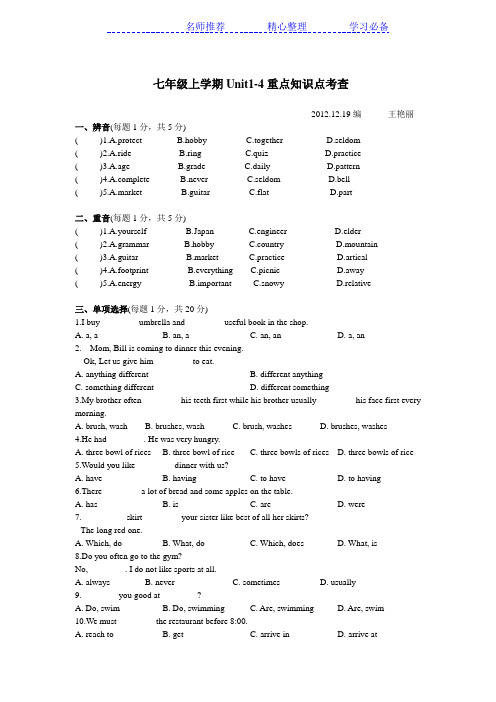
七年级上学期Unit1-4重点知识点考查2012.12.19编王艳丽一、辨音(每题1分,共5分)( )1.A.protect B.hobby C.together D.seldom( )2.A.ride B.ring C.quiz D.practice( )3.A.age B.grade C.daily D.pattern( )plete B.never C.seldom D.bell( )5.A.market B.guitar C.flat D.part二、重音(每题1分,共5分)( )1.A.yourself B.Japan C.engineer D.elder( )2.A.grammar B.hobby C.country D.mountain( )3.A.guitar B.market C.practice D.artical( )4.A.footprint B.everything C.picnic D.away( )5.A.energy B.important C.snowy D.relative三、单项选择(每题1分,共20分)1.I buy ________ umbrella and ________ useful book in the shop.A. a, aB. an, aC. an, anD. a, an2.---Mom, Bill is coming to dinner this evening.---Ok, Let us give him ________ to eat.A. anything differentB. different anythingC. something differentD. different something3.My brother often ________ his teeth first while his brother usually ________ his face first every morning.A. brush, washB. brushes, washC. brush, washesD. brushes, washes4.He had ________. He was very hungry.A. three bowl of ricesB. three bowl of riceC. three bowls of ricesD. three bowls of rice5.Would you like ________ dinner with us?A. haveB. havingC. to haveD. to having6.There ________ a lot of bread and some apples on the table.A. hasB. isC. areD. were7.-- ________ skirt ________ your sister like best of all her skirts?--The long red one.A. Which, doB. What, doC. Which, doesD. What, is8.Do you often go to the gym?No, ________. I do not like sports at all.A. alwaysB. neverC. sometimesD. usually9.________ you good at ________?A. Do, swimB. Do, swimmingC. Are, swimmingD. Are, swim10.We must ________ the restaurant before 8:00.A. reach toB. getC. arrive inD. arrive at11.Lucy usually drinks a cup of milk ________ the morning. But ________ the morning of last Friday she drank nothing.A. in, inB. on, inC. in, onD. on, on12.The cook always says his dishes look ________ and smell ________.A. good, goodB. well, wellC. good, wellD. well, good13.Jack was so clever that he could find out the answer ________ this question in one minute.A. ofB. withC. aboutD. to14.My mom enjoys ________.A. walking homeB. to walk homeC. walking to homeD. to walk to home15.Mary is very ________ now, because she has just heard about some ________ news.A. excited, excitingB. exciting, excitedC. excited, excitedD. exciting, exciting16.He usually ________ a bus to school and I go to school ________.A. by, on bikeB. takes, on bikeC. by, by bikeD. takes, by bike17.How dangerous! She was driving the car with one hand and holding an ice cream with ________A. the otherB. anotherC. othersD. other18.Can you wait for ________ minutes?A. a littleB. fewC. a fewD. a little19.After working for a long time, the farmer stopped ________ a rest.A. to haveB. havingC. to havingD. have20.________ is very difficult for him ________ this math problem.A. This, to work outB. It, working outC. This, working outD. It, to work out四、单词拼写(每题1分,共20分)1. My h________ are playing football and watching TV in my free time.2.Germany is a famouse c________ in Europe.3.Sunglasses can p________ our eyes from the sunshine.4.The wind b________ gently in spring.5.Jimmy often f________ kites in the park every Sunday.6.In my d________ life, I usually go to school in the morning and do the homework at night.7.The weather is so fine. The sun s________ brightly in the sky.8.Lucy does not play the piano well. She needs more p________.9.Mr. Green is very f________ to us and we like him very much.10.I want to take a t________ to the USA to visit my e-friend Bobby11.In "Speaking", we learn about different s _______ in English.12.My mother often goes to the m_______ to buy some fruit for me.13.Liz asks us to do some reading d_______ and copy some new words from thereading passages.14.He can play the g_____ very well and sometimes he writes songs for his friends.15.Now more and more people use clean e______ from the sun, wind and other natural (自然的) sources.16.The dog left some f_______ on the floor when it came out of the bathroom.17.Don't b______ things in the forest. It is very dangerous.18.The lake isn't small at all. It is quite l________.19.The teacher told us how to write a _______ about pollution in English.20.In Unit3, we learned how to use the p________ "there is/are...".五、完成句子(每题2分,共40分)1.大自然给我们提供很多东西,例如新鲜空气和水。
沪教牛津版七上 U1-4知识点、语法

7A UNIT 1 Making friends练习题一、用a ,an,the 或者\ 填空1.There is ______ water on the floor.2.There is ___ orange on ____ desk.3.知识点1.Read a German girl’s blog。
(Page1)German :① adj.德国的?(德国人的,德语的)This is a German car。
② n.德国人,是可数名词。
复数形式要在后面加“s”。
意为“德语”时,是不可数名词。
Eg.Germans speak German。
中国China,中国人/中文Chinese 日本Japan,日本人/日语Japanese,法国France,法国人/法语French 英国England/Britain/U.K.英国人/英语EnglishFrenchman、Englishman等的复数把a改为e.2.Every day,I go to school by school bus.(page3)go to school是一个固定搭配,不要在“ school”前加“the”。
因为它并不指具体的某所学校。
所在在前面不要加任何冠词。
Go to bed 睡觉;go to hospital去医院;at home 在家注意:play basketball/football(球类),不用加“the”。
Play the piano/violin(乐器),要加“the”。
3.I like many sports.(page3)many :许多。
修饰可数名词复数。
Many sports 许多人Much:许多。
修饰不可数名词much water/time 许多水/手机a lot of既可以修饰可数名词又可以修饰不可数名词。
4.I’d like to be your e-friend. 我想成为你的网友。
(page11)语法一、人称代词2.is和单数第三人称he /she /it(他/她/它)连用,二、句子模式两种句子模式:A:无行为动作句子,简称“Be动词句子模式”。
七年级上册英语1至4单元知识点
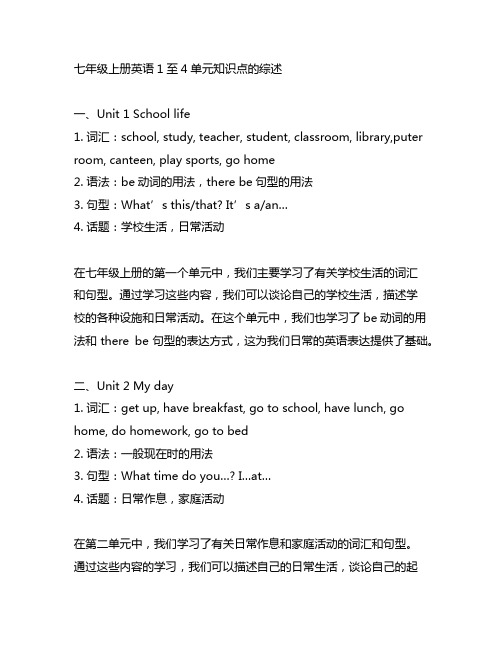
七年级上册英语1至4单元知识点的综述一、Unit 1 School life1. 词汇:school, study, teacher, student, classroom, library,puter room, canteen, play sports, go home2. 语法:be动词的用法,there be句型的用法3. 句型:What’s this/that? It’s a/an…4. 话题:学校生活,日常活动在七年级上册的第一个单元中,我们主要学习了有关学校生活的词汇和句型。
通过学习这些内容,我们可以谈论自己的学校生活,描述学校的各种设施和日常活动。
在这个单元中,我们也学习了be动词的用法和there be句型的表达方式,这为我们日常的英语表达提供了基础。
二、Unit 2 My day1. 词汇:get up, have breakfast, go to school, have lunch, go home, do homework, go to bed2. 语法:一般现在时的用法3. 句型:Wha t time do you…? I…at…4. 话题:日常作息,家庭活动在第二单元中,我们学习了有关日常作息和家庭活动的词汇和句型。
通过这些内容的学习,我们可以描述自己的日常生活,谈论自己的起居和家庭活动。
学习了一般现在时的用法,使我们能够更准确地表达自己的日常行为和习惯。
三、Unit 3 Hobbies1. 词汇:hobby, watch TV, play basketball, listen to music, read books, playputer games, collect stamps, take photos2. 语法:动词-ing形式的用法3. 句型:What do you like doing? I like…4. 话题:兴趣爱好,课外活动在第三单元中,我们学习了有关兴趣爱好和课外活动的词汇和句型。
牛津沪教版英语七年级上 Units1-5重点知识点复习
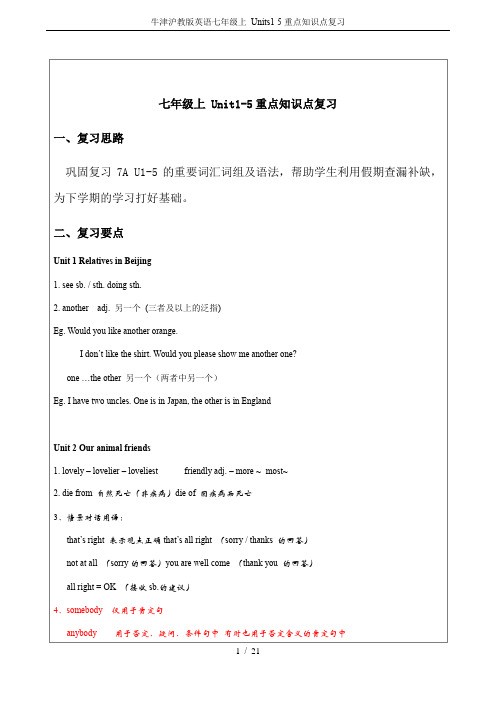
A. is going to be B. is going to have
C. will have D. are going to be
BAABD CCAAA
II.一般现在时
1.表示现在的状态,经常或者习惯性的动作,客观事实或者存在,主语所具备的性格和能力
5.bake v. baker n. bakery n.
6.cook v.烧饭cook n.厨师cooker n.厨具cookery n.烹饪
do some cooking做饭
7.constructionn.under ~建设中construct v.建造
8.remove v.移去、搬走~ sth.from sp.从…搬走removaln.
2.too+形容词原级+to sb./sth.太…以至于不能
too+形容词原级+for sb.对某人而言太…
3.much + adj./adv.比较级……的多, much修饰adj.的比较级
much more much better much worse
much less much loveliermuch more different
14.blind adj.
The + adj.表示某类人(复数含义)
15.Inmany different ways在很多不同的方面
16. missing adj.失踪的miss v.(1)思念(不在身边的)(2)错过
Unit 3 friends from other countries
1.crowded adj.拥挤的crowd n.人群be crowded with挤满了
初一上册英语复习提纲沪教版

初一上册英语复习提纲沪教版1.Good morning / afternoon / evening. 早上好/ 下午好 / 晚上好。
2. How are you! 你好吗?I’m fine / OK, thanks. 我很好,谢谢!How is your mother? 你的妈妈好吗?She is fine. 她身体好。
And you? 你呢?(你好吗?)(Starter)Unit 2.1. What’s this in English? 这个(用英语)怎么说?2. What’s this? 这个是什么?It’s a map / an orange. 它是一张地图 / 它是一个桔子。
3. Spell it, please. 请拼写它。
How do you spell it? 你怎样拼写它?(Starter)Unit 3.1. What color is it? 它是什么颜色?What color is your pen? 你的钢笔是什么颜色?2. It’s red / blue / black and white. 它是红色 / 蓝色 / 黑白色。
. 英文中常用的问候语及其回答:-Hello. -Hello.―Hi. ―Hi.―Good morning. ―Good morning.―Good afternoon. ―Good afternoon.―Good evening. ―Good evening.(用于晚上遇到别人时的问候语)―Good night. ―Good night. (用于晚上和别人告别时的问候语)―How are you? ―I’m fine, thank you / thanks.―Fine, tha nk you / thanks.―How do you do? ―How do you do?你好! (初次见面)―Nice to meet you! ―Nice to meet you! 很高兴见到你 (初次见面)Unit 1.短语:1.my( your/his/her /its)name我的(你的,他的,她的,它的)名字st name(family name)姓氏3.first name(given name) 名字4.telephone number电话号码5.an ID card 一张身份证6.in China 在中国句型:1. What’s your name? 你叫什么名字?What’s her / his name? 她 / 他叫什么名字?2. What’s your first name你的名是什么?What’s your last / family name? 你姓什么?(last name = family name)3. I’m Mary. = My name is Mary. 我叫玛丽。
七年级上英语知识梳理(牛津上海版)U1-U4

七年级上英语知识梳理一、做题技巧、常考题型的考点梳理:1.听力题:发下试卷后,要先浏览一遍题目,而在做听力的时候,如是选择含有信息的题目,注意:细听。
如果是完成表格的题目,注意:要找出关键词,针对这些关键词去听。
如果是根据短文回答问题的题目,要在发下试卷后,重点浏览该题目,在听短文的时候,要认真听,用简单的方法在题目旁标记一个记号(如单词缩写、国家等)答案,听最后一遍时,要学会检查。
2.语音题:语音题大多数是5-6题,都是考我们对音标的熟练程度,常考/i:/,s/z,/e/,/a:/等。
3.单项选择:常考时态、动词形式、短语搭配、常识题综合题型。
4.语法选择:常考连词、动词形式、短语搭配、be动词形式、情态动词、句式结构。
6.完形填空:主要考4个单词的不同意思。
5.阅读理解:重点在于阅读文章,弄清文章主要内容,根据文章内容,选择正确答案。
6.单词拼写:重点考查我们对单词的拼写,少数情况会涉及动词形式。
7.完成句子:考察单词、短语熟练度,大多数情况下涉及动词形式。
8.如何正确填入动词形式?动词三步曲:一、先看时态;二、再看主语;三、分析句式;终极一步:【再填动词】步骤解说:一、先看时态:我们可以根据句中的特征词来分析时态。
(如,看见usually我们便知道这是一般现在时)二、再看主语:在一般现在时中,主语是一个人,我们就使用动词的第三人称单数形式;主语是两个人或以上,我们就使用动词的原形。
(三、分析句式:不是所有的句子都可以按照上述两个方法分析后直接填入动词的,如果句子是疑问句或否定句,疑问句或否定句中含有助动词does、do或did的话,我们就要使用动词的原形;看到情态动词can,may,must我们终极一步:【再填动词】当做好以上分析句子的工作后,我们就能正确无误的填入动词了。
二、书本知识点:Module1 My lifeUnit1 Making friends学习导图:V ocabulary1.everyone(每个人)除此之外,还有:everybody,everything,anyone,anyboday,anything。
牛津上海版七年级第一学期英语第1-4单元知识点与练习题(含答案)
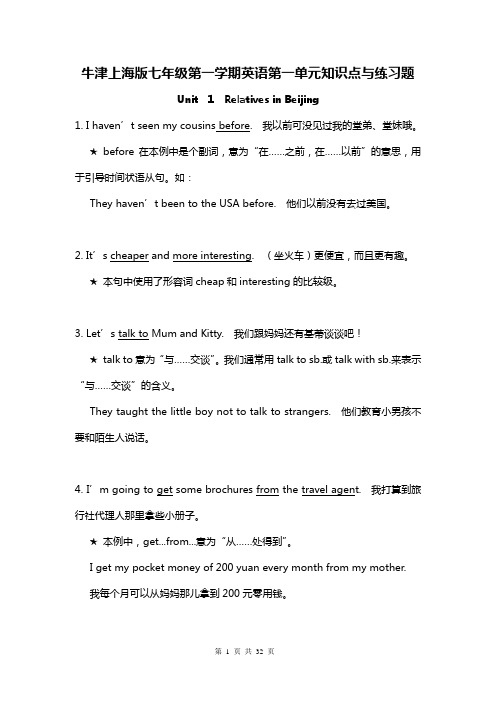
牛津上海版七年级第一学期英语第一单元知识点与练习题Unit 1 Relatives in Beijing1. I haven’t seen my cousins before. 我以前可没见过我的堂弟、堂妹哦。
★before在本例中是个副词,意为“在……之前,在……以前”的意思,用于引导时间状语从句。
如:They haven’t been to the USA before. 他们以前没有去过美国。
2. It’s cheaper and more interesting. (坐火车)更便宜,而且更有趣。
★本句中使用了形容词cheap和interesting的比较级。
3. Let’s talk to Mum and Kitty. 我们跟妈妈还有基蒂谈谈吧!★talk to意为“与……交谈”。
我们通常用talk to sb.或talk with sb.来表示“与……交谈”的含义。
They taught the little boy not to talk to strangers. 他们教育小男孩不要和陌生人说话。
4. I’m going to get some brochures from the travel agent. 我打算到旅行社代理人那里拿些小册子。
★本例中,get...from...意为“从……处得到”。
I get my pocket money of 200 yuan every month from my mother.我每个月可以从妈妈那儿拿到200元零用钱。
5. Yes, we’d like to travel to Beijing by plane. 是的,我们想坐飞机去北京。
★would like to do sth. 意为“想要做某事”,相当于want to do sth. 如:I’d like to have a swim in the sea. 我想去海里游泳。
(= I want to have a swim in the sea.)★travel to...意为“到……旅游”,相当于have a trip to...。
牛津上海版七年级英语上册Unit1-4重点短语知识点复习

牛津上海版七年级英语上册Unit1-4重点短语知识点复习第一单元在市中心在郊区居住想要买In the centre of town in the suburbs live in+sw want to buy 谈论需要乘坐公交面向南方同意你的观点talk about need to take a bus face south agree with sb 公共交通轻轨站地铁站看一看public transport light rail station underground station look at下星期过去经常做某事为某人买某物住宅区next week used to do sth buy sth for sb/buy sb sth housing estate 许多把~~放在一起寻找照顾,照看a lot of/lots of put sth together look for look after/take care of sb 在~~的前面走十分钟路程顺便说一下In (the) front of ten minutes’ walk by the way(注意有the的区别)开乔迁晚会have/hold a house-warming party儿童游乐场高兴做~~children’ playground be happy to do sth回来回去狭窄的街道在我们的房子旁边Come back go back narrow streets beside our house在街上迷路植树节迟到几分钟In the street lose one’s way Tree Planting Day a few minutes late出发,开始做~~Set out to do sth/set about doing sth使我们的城市更漂亮Make our city more beautiful浇花挖一个洞在那一天空调water flowers dig a hole on that day air conditioner砍倒随意停止做某事变得越来越方便Cut down at will stop doing sth become more and more convenient 足够的空间离~~远与某人分享~~enough space be far (away) from share sth with sb盼望拥有我自己的卧室Look forward to doing sth have my own bedroom第二单元用~~装饰~~ 国旗看烟花展decorate.... with... national flag watch fireworks display举办宴会去观光音乐电视hold a gala go sightseeing Music TV在9月30号晚上聚集在一起,聚会on the evening of September 30 get together号召,拜访外滩发出邀请call on (sb to do sth) the Bund send/make an invitation接受邀请拒绝邀请上演节目accept an invitation decline an invitation put on performances去看电影享受更加幸福和富裕的生活go to movies enjoy a happier and richer life传统节日月饼看灯会traditional festival moon cake watch lantern display赏月扫墓举行赛龙舟Enjoy the moon seep tombs hold /have a dragon boat race 放鞭炮告诉某人关于某事set off firecrackers tell sb about sth难怪收集信息做调查no wonder collect information make/do a survey好好打扫一下压岁钱更衣室have a good cleaning lucky money changing room在~的开端对~感激庆祝丰收At the beginning of be thankful to celebrate harvest从那个时候起试穿等等(用于举例)From then on try on and so on去睡觉店员努力做某事go to bed shop assistant try one’s best to do sthtry to do sth三单元动身去某地上英语课进行一次学习旅行Leave for sw attend English class have/go on/take a study trip 学习计划去度假包价旅游Plan for study go on holidays package tour观光旅游我的一个朋友豫园go sightseeing a friend of mine the Yu Garden人民广场出发,动身,开始做某事People’s Square set out to do sth名胜古迹最著名的建筑之一place of historical interest one of the famous buildings玩得开心,过得愉快英文演讲比赛Enjoy oneself/have fun/have a good(great) time English speaking contest 带某人参观某地呆得很愉快Show sb around enjoy one’s stay暑假寒假观光车Summer holidays winter holidays sightseeing bus在工作日在周末野营On weekdays at weekends camping trip 因~出名中国旅行社出发日期Be famous for China Travel Agency departure time预定旅游在电脑上核对信息Book a tour check information on the computer门票,入场券乘飞机四天的旅程Admission ticket (for) by plane/air; take a plane a four-day trip 稍等片刻,坚持住三星级饭店听起来好极了hold on three-star restaurant/hotel sound great 看起来很漂亮让某人做某事儿Look very beautiful let/have/make sb do sth从~到~ 往返交通方式from...to..... to and from means of transport核对以下的旅游信息一位旅游代理人Check the following travel information a travel agent感谢某人做了某事我高兴的了解到~ thank sb for doing sth I’m happy/glad to learn that 到达某地学到关于~的很多知识Arrive at/in; get to +sw; reach+sw learn a lot about sth向某人人学习著名的旅游景点Learn from sb famous places of interest; famous tourist attractions现代都市周游世界在晚上Modern city travel around the world in the evening独自在~的第一天By oneself on the first day of有一次愉快的旅程获奖者Have an enjoyable/wonderful journey prize winner在飞机上在同一趟包价旅游On the plane on the same package tour回家的路上对~感兴趣不但~而且on the way home be interested in sth/in doing sth not only,but also丰富我们的知识拓展我们的思维Enrich our knowledge broad our mind赢得一等奖古老的建筑在东边Win the first prize ancient building in the east (of)四单元取出,拿出一个接一个醒来Take out one after another wake up告诉某人去(不去)做某事童话故事生某人的气Tell sb (not) to do sth fairy tales be angry with sb孤身一人走在森林里咬了~~一口给某人某物Walk alone in the forest have a bite of give sb sth/give sth to sb 不管,不理会碰巧做某事过着富裕的生活Leave alone happen to do sth live a rich life不停地,连续不断地从那时起走开On and on ever since then walk away最终魔镜侦探故事At last magic mirror detective stories起初,最初科幻小说完成做某事At first science fiction finish doing sth介意做某事儿成功做某事大众科学,通俗科学Mind doing sth manage to do sth popular science立刻,马上对~~感到厌烦继续做某事At once be bored with go on doing sth/go on with sth 不再参加,加入听音乐Not.....any more take part in/join in listen to music看电影上演短剧See a film/go to movies put on short plays漏掉的表达补充Have an area of....... 占地~Go to.....by bike=ride a bike to.....Go to.....by bus=take a bus to......Go to......by plane/air=fly to.......Give sth back to sb 把某物归还给某人There used to be 过去有There is going to be 将会有Do a project on 做某方面的课题Be a member of..... 成为~的一员Stop ~ from doing ~=keep/prevent ~ from doing ~ 阻止~免受~的伤害Call on sb to do sth 号召某人做某事Call sb on+电话号码打某个电话联系某人Plan to dosth 计划做某事Needn’t do sth=don’t have to do sth 没有必要做某事Like.....best=favorite 最喜欢~Start with 以~开始End with 以~结束Try to do sth 努力做某事Try doing sth 试着做某事Try one’s best to do sth 尽力做某事In the end=at last=finally 最后,最终Bring sb sth=bring sth to sb 给某人带某物Keep fit/healthy 保持身体健康Be surprised to do sth 惊讶的做某事。
牛津沪教版英语七年级上 Units1-5重点知识点复习

七年级上 Unit1-5重点知识点复习1、复习思路巩固复习7A U1-5的重要词汇词组及语法,帮助学生利用假期查漏补缺,为下学期的学习打好基础。
二、复习要点Unit 1 Relatives in Beijing1. see sb. / sth. doing sth.2. another adj.另一个(三者及以上的泛指)Eg. Would you like another orange.I don’t like the shirt. Would you please show me another one?one …the other另一个(两者中另一个)Eg. I have two uncles. One is in Japan, the other is in EnglandUnit 2 Our animal friends1. lovely – lovelier – loveliest friendly adj. – more ~ -most~2. die from自然死亡(非疾病)die of因疾病而死亡3.情景对话用语:that’s right表示观点正确that’s all right(sorry / thanks的回答)not at all(sorry的回答)you are well come(thank you的回答)all right = OK(接收sb.的建议)4.somebody 仅用于肯定句anybody 用于否定、疑问、条件句中有时也用于否定含义的肯定句中5.leave 离开 leave puppy 遗弃leave A to B 离开 A 去 B 6.keep +n. + adj. keep +adj.leave rubbish 扔 leave for B 去 B keep doing sth.7.prefer v. –prefers- preferring-preferred 8.care v.关心 n.照料 adj.adv. carefully (opp.) careful ( opp.) carelesscarefulness (opp.) take care of doingcarelessly n. carelessness take care = be careful 9. adv.+ adj. 10. enough+n.adv 放在 adj.前 adj.+ enough11. every day 和 everyday 的区别:adv.时间状语定语每天的 everyday life 每天的生活save v. safe adj.安全的 safely adv.安全地 safety n.安全 raise a flag 升旗 raise kids 养孩子every day每天everyday adj.12. 13. raise money 筹钱 14. blind adj.The + adj.表示某类人(复数含义) 15. In many different way s 在很多不同的方面16. missing adj.失踪的 miss v.(1)思念(不在身边的)(2)错过Unit 3 friends from other countries1. crowded adj.拥挤的 crowd n.人群 be crowded with 挤满了2. over=more than3. Read 直接 + n. read about = read sth. about 后加某个对象或事件 in the newspaper4. in the magazine5. know about 知道认识(双向)know 了解 XXX 单向6. 8 at school 表示在上学 at the school 表示在学校,不一定在上学adj.What is your nationality?回答要用形容词nationality 国籍9 make friend s with 与…交友 Unit 4 Jobs people do1 what’s your job? =what do you do ? work [u] n. a piece of work job :指已做、应做具体的工作work:指工作,泛指工作,不具体或抽象2. 3. be good at +n./doing sth. = do well in +n./doing sth. job be to do delivery [c]n.递送,邮件 deliver sth. to sp. = sendone’s 4. deliver v. 5. bake v. baker n. cook n.厨师bakery n. 6. cook v.烧饭cooker n.厨具cookery n.烹饪do some cooking 做饭 7. construction n.under ~建设中 construct v.建造~ sth. from sp.从…搬走8. remove v.移去、搬走removal n.9. the same … as … the same 后常加名词单数 the same …as = as … as …the same height as = as tall asmanage v. manage to do sth. the same weight as = as heavy as10. 11. broken adj. 1 )坏的3 )(由于事故)折断的 v. break – broke – brokenbreak [c] n.休息 have a break=have a rest=take a break both … and … 2 )破碎的4)断断续续12. 连接的两部分一样 Unit 5 choosing new flat 1. choose–chose-chosenV.选择 Choice n.选择2.3. too+形容词原级+to sb./sth.太…以至于不能too+形容词原级+for sb.对某人而言太…much + adj./adv.比较级……的多, much修饰adj.的比较级much moremuch lessmuch better much worsemuch lovelier much more different4. with 1)带有和…一起a lady with short hair2) who’s that boy with SAM3)带在身边how much do you take with you4)用… fix TV with a hammer5. what’s the matter?怎样啦?What’s matter with sb.用来询问某人有什么麻烦?= what’s wrong with sb.6. where do you want the … ?= where do you want me to put the…?语法:I. There be句型※构成:“There be +某物/某人+某地/某时”;此结构表示“某地/某时有某人/某物”。
七上unit1--4复习
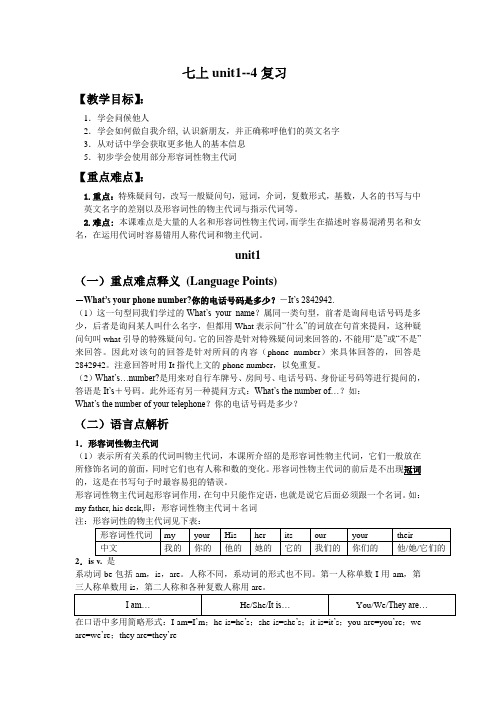
七上unit1--4复习【教学目标】:1.学会问候他人2.学会如何做自我介绍, 认识新朋友,并正确称呼他们的英文名字3.从对话中学会获取更多他人的基本信息5.初步学会使用部分形容词性物主代词【重点难点】:1.重点:特殊疑问句,改写一般疑问句,冠词,介词,复数形式,基数,人名的书写与中英文名字的差别以及形容词性的物主代词与指示代词等。
2.难点: 本课难点是大量的人名和形容词性物主代词,而学生在描述时容易混淆男名和女名,在运用代词时容易错用人称代词和物主代词。
unit1(一)重点难点释义(Language Points)-What’s your phone number?你的电话号码是多少?-It’s 2842942.(1)这一句型同我们学过的What’s your name?属同一类句型,前者是询问电话号码是多少,后者是询问某人叫什么名字,但都用What表示问“什么”的词放在句首来提问,这种疑问句叫what引导的特殊疑问句。
它的回答是针对特殊疑问词来回答的,不能用“是”或“不是”来回答。
因此对该句的回答是针对所问的内容(phone number)来具体回答的,回答是2842942。
注意回答时用It指代上文的phone number,以免重复。
(2)What’s…number?是用来对自行车牌号、房间号、电话号码、身份证号码等进行提问的,答语是It’s+号码。
此外还有另一种提问方式:What’s the number of…?如:What’s the number of your telephone?你的电话号码是多少?(二)语言点解析1.形容词性物主代词(1)表示所有关系的代词叫物主代词,本课所介绍的是形容词性物主代词,它们一般放在所修饰名词的前面,同时它们也有人称和数的变化。
形容词性物主代词的前后是不出现冠词的,这是在书写句子时最容易犯的错误。
形容词性物主代词起形容词作用,在句中只能作定语,也就是说它后面必须跟一个名词。
七年级英语上册Unit1-Unit4复习
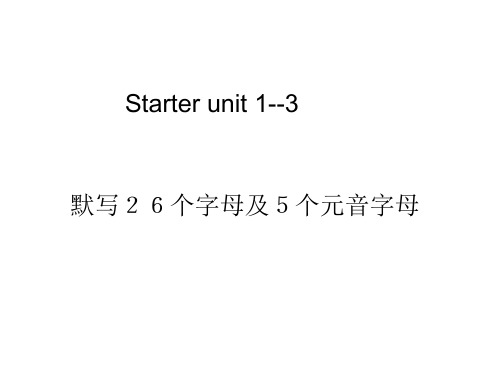
元音字母
Aa Ee Ii Oo Uu
把Aa-Zz按相同的音素进行分类:
/ei/
/i:/
/e/ /ai/
/ju:/
A: _________________, Cindy!
B: Good morning, Bob.
______________________?
How are you?
Jenny: _I_’m__O_K__. _________ Bob:__It_’s__an__o_ra_n_g_e_.___
Bob,what’s this in
_E_n_g_li_s_h_? _________ Jenny:_S_p_e_l_l _it_,_p_le_a_s_e_. ___ Bob:__O_-_R_-_A_-_N_-_G_-_E_.__ Jenny: _W__h_a_t _co_l_o_r_i_s_it_?___ Bob: _I_t’_s_o_r_a_ng_e_.______
• 2. What’s his name ?
• His name’s…
• 3. What’s her name?
• Her name ‘s…. • 4. Nice to meet you !
• 5. How do you do?
6. What’s your first /last name?
My first / last name’s.. 7. What’s your/his /her telephone number?
5. Spell it , please.
unit3 6.What color is it?
•It’s red /yellow /green /blue /black /white
初一上册1至四单元复习背诵内容

输入 说明标文题的写
作要求
说明文的概 念
准确、客观、条理清晰、语言简练。
说明文的分 类
下定义、举例子、分类别、列数字、作比较等。
说明方法
事物说明文、事理说明文。
应用文写作
应用文的概念
应用文是一种实用文体,它包括书信、通知、报告、计划、总结等, 主要用于处理日常事务和交流信息。
03
了解多音字和形近字的 辨析。
04
熟悉查字典的方法和技 巧。
词汇和短语
掌握课本中出现的常 用词汇和短语,包括 词义、用法和搭配。
学习常用成语和俗语, 理解其含义和用法。
了解近义词、反义词 和同义词的辨析和应 用。
句子结构
掌握基本句型和句子成分,如 主语、谓语、宾语、定语、状 语等。
学习简单句、并列句和复合句 的构成和转换。
记叙文写作
记叙文的概念
记叙文的六要素
记叙文是以记人、叙事、写景、状物为主 ,以写人物的经历和事物发展变化为主要 内容的一种文体形式。
时间、地点、人物、起因、经过、结果。
记叙文的顺序
顺叙、倒叙、插叙。
记叙文的表达方式
叙述、描写、议论、抒情。
说明文写作
说明文是以说明为主要表达方式的一种文体,它通过 对事物的性质、特点、成因、功用等方面的描述和解
信息,并准确提取出来。
常见的细节理解题包括直接信息 题、间接信息题和信息匹配题等。
主旨大意
主旨大意题是阅读理解中较为重 要的一种题型,主要考察学生对 文章整体内容的理解和概括能力。
解答主旨大意题时,学生需要仔 细阅读文章,把握文章的主题和 中心思想,并能够用自己的语言
进行概括。
七年级第一学期英语知识点复习提纲(沪教版)
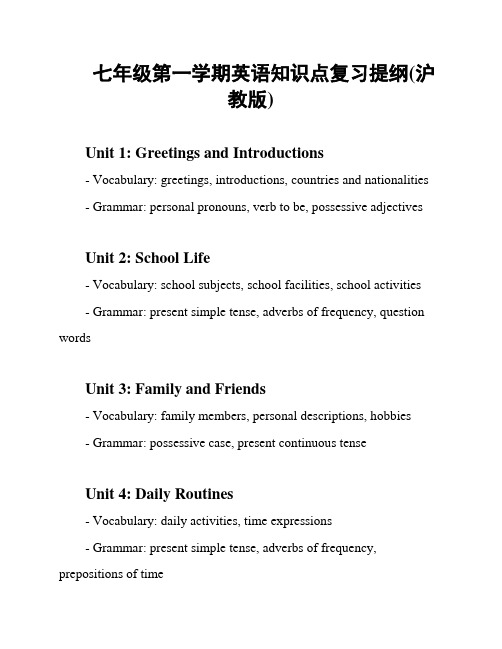
七年级第一学期英语知识点复习提纲(沪教版)Unit 1: Greetings and Introductions- Vocabulary: greetings, introductions, countries and nationalities - Grammar: personal pronouns, verb to be, possessive adjectivesUnit 2: School Life- Vocabulary: school subjects, school facilities, school activities - Grammar: present simple tense, adverbs of frequency, question wordsUnit 3: Family and Friends- Vocabulary: family members, personal descriptions, hobbies- Grammar: possessive case, present continuous tenseUnit 4: Daily Routines- Vocabulary: daily activities, time expressions- Grammar: present simple tense, adverbs of frequency, prepositions of timeUnit 5: At the Supermarket- Vocabulary: food and drinks, shopping expressions- Grammar: countable and uncountable nouns, some and anyUnit 6: Free Time- Vocabulary: sports and hobbies, leisure activities- Grammar: can and can't, imperativesUnit 7: Clothes and Colors- Vocabulary: clothing items, colors, descriptions- Grammar: demonstrative pronouns, there is/are, how much/manyUnit 8: Festivals and Celebrations- Vocabulary: festivals and celebrations, traditional activities- Grammar: past simple tense, adjectivesUnit 9: Travel- Vocabulary: means of transportation, travel destinations, directions- Grammar: future tense, prepositions of placeUnit 10: Health and Fitness- Vocabulary: body parts, health problems, healthy habits- Grammar: should and shouldn't, adverbs of manner注意事项:- 复时,可以通过阅读相关教材中的文章、朗读对话、完成练题等方式巩固所学知识。
- 1、下载文档前请自行甄别文档内容的完整性,平台不提供额外的编辑、内容补充、找答案等附加服务。
- 2、"仅部分预览"的文档,不可在线预览部分如存在完整性等问题,可反馈申请退款(可完整预览的文档不适用该条件!)。
- 3、如文档侵犯您的权益,请联系客服反馈,我们会尽快为您处理(人工客服工作时间:9:00-18:30)。
广州初一英语上海教育版上册1—4单元复习Unit 1 Making friends一.重点短语close to (在空间,时间上)接近go to school去上学(be) good at 擅长make friends with 与…….交朋友all over 遍及…d like to =would like to 愿意二.句型及语法1.谈论喜好:enjoy (doing) sth. be keen on (doing) sth. My (favourite) hobby is …(doing)…like to do / doing sth. would like to do(‟d like to do) = want to doI would like to be your pen-friend. 我想成为你的笔友。
I am interested in drawing. 我对画画感兴趣。
I am keen on drawing. 我热衷于画画。
I enjoy drawing. 我喜欢画画。
My favourite hobby is drawing. 我喜欢画画。
2.特殊疑问句要点:1)改句时,原句中如有助动词(be, can, must, shall, will等)的,把第一个助动词提前;没助动词的,加do(各时态)2)对主语提问时,用what或who代替划线部分,动词不变,如:Jim works hardest in our class. →Who works hardest in your class?3)对形容词、副词、及表方式的介词短语提问,用howPeople work out difficult problems with computers. →How do people work out difficult problems?4)对频率(如once a week, twice a month, )提问,用how oftenI visit my grandparents twice a month. →How often do you visit your grandparents?5)对看不见的原因提问,用why; 回答用because.Why do you late for school ? Because my bike is broken on the way.6) 对时间提问,用when;When do you get up?7) 询问“哪一个”用which.Which one do you prefer, the red one or the green one ?你更喜欢哪一个,红色的那件还是绿色的那件?8)Those books are Lily‟s.(问归属)are those books?练习:对下列句子的划线部分提问1. That car is red. _____ _____ is that car?2. My sister is 20 years old. ______ _____ is your sister?3. The glasses are Jim’s. ______ glasses are these?4. Tom collected eggs last Sunday. ______ collected eggs last Sunday?5. There were eleven books in my bag.______ ______ books are there in your bag?6. We visited our teachers on Teacher’s Day. _______ did you visit your teachers?7. It means “Do not touch”._______ does it mean?8. I’m fine, thank you.______ are you?9. We go to school by bus.______ do you go to school?10.We go to school five times a week._______ ______ do you go to school?二、对下列句子的划线部分提问,将答案写在横线上。
1. My name is Mary.((划提)2. My shirt is white.(划提)3. That is your suit. (划提)4. This is my umbrella.(划提)5. It‟s a V olvo. (划提)6. He is an office assistant.(划提)7.He is American. (划提)3. 冠词:不定冠词的用法冠词是虚词,本身不能单独使用,也没有词义,它用在名词的前面,帮助指明名词的含义。
英语中的冠词有三种,一种是定冠词(the Definite Article),另一种是不定冠词(the Indefinite Article),还有一种是零冠词(Zero Article)。
不定冠词a(an)与数词one 同源,是“一个”的意思。
a用于辅音音素前,一般读作[e],而an则用于元音音素前,一般读做[en]。
1)表示“一个”,意为one;指某人或某物,意为a certain。
A Mr. Ling is waiting for you.2)代表一类人或物。
A knife is a tool for cutting with.Mr. Smith is an engineer.3)词组或成语。
a little / a few / a lot / a type of / a pile / a great many / many a / as a rule / in a hurry / in a minute / in a word / in a short while / after a while / have a cold / have a try / keep an eye on / all of a sudden定冠词的用法定冠词the与指示代词this,that同源,有“那(这)个”的意思,但较弱,可以和一个名词连用,来表示某个或某些特定的人或东西。
1)特指双方都明白的人或物:Take the medicine.把药吃了。
2)上文提到过的人或事:He bought a house.I’ve been to the house.他买了幢房子。
我去过那幢房子。
3)指世上独一物二的事物:the sun,the sky,the moon,the earth4)单数名词连用表示一类事物:如:the dollar 美元;the fox 狐狸;或与形容词或分词连用,表示一类人:the rich 富人;the living 生者。
5)用在序数词和形容词最高级,及形容词only,very,same等前面:Where do you live?I live on the second floor. 你住在哪?我住在二层。
That’s the very thing I’ve been looking for. 那正是我要找的东西。
6)与复数名词连用,指整个群体:They are the teachers of this school.指全体教师)They are teachers of this school. (指部分教师)7)表示所有,相当于物主代词,用在表示身体部位的名词前:She caught me by the arm……她抓住了我的手臂。
8)用在某些由普通名词构成的国家名称、机关团体、阶级、等专有名词前:the People’s Republic of China中华人民共和国the United States 美国9)用在表示乐器的名词之前:She plays the piano.她会弹钢琴。
10)用在姓氏的复数名词之前,表示一家人:the Greens 格林一家人(或格林夫妇)11)用在惯用语中:in the day,in the morning (afternoon,evening),the day after tomorrowthe day before yesterday,the next morning,in the sky (water,field,country)in the dark,in the rain,in the distance,in the middle (of),in the end,on the whole,by the way,go to the theatre零冠词的用法1)国名,人名前通常不用定冠词:England,Mary;2)泛指的复数名词,表示一类人或事物时,可不用定冠词;They are teachers. 他们是教师。
3)抽象名词表示一般概念时,通常不加冠词;Failure is the mother of success.失败乃成功之母。
4)物质名词表示一般概念时,通常不加冠词,当表示特定的意思时,需要加定冠词;Man cannot live without water.人离开水就无法生存。
5)在季节、月份、节日、假日、日期、星期等表示时间的名词之前,不加冠词;We go to school from Monday to Friday. 我们从星期一到星期五都上课。
6)在称呼或表示官衔,职位的名词前不加冠词;The guards took the American to General Lee.士兵们把这个美国人送到李将军那里。
7)在三餐、球类运动和娱乐运动的名称前,不加冠词;如:have breakfast,play chess8)当两个或两个以上名词并用时,常省去冠词;I can’t write without pen or pencil.没有钢笔和铅笔,我就写不了字。
9)当by 与火车等交通工具连用,表示一种方式时,中间无冠词;by bus,by train;10)有些个体名词不用冠词;如:school,college,prison,market,hospital,bed,table,class,town,church,court 等个体名词,直接置于介词后,表示该名词的深层含义;go to hospital 去医院看病go to the hospital 去医院(并不是去看病,而是有其他目的)11)不用冠词的序数词;a. 序数词前有物主代词b. 序数词作副词:He came first in the race.c. 在固定词组中:at (the)first,first of all,from first to last1)注意以下冠词:a university a European boy a useful book a uniforman unlucky cat an hour an honest girl2)球类运动不加冠词,乐器要加the,如:play football, play the piano3)注意以下几组短语中的冠词:by bus & take a bushave dinner & have a quick dinnerwatch TV & listen to the radio冠词专项练习Ⅰ在下列名词前填入a或an.1 month2 clinic3 Apple4 carnation5 knife6 fridge7 hospital 8 photoⅡ在下列词组前,填入a、an、或the.9 piece of paper 10 Great Wall11eat pineapple 12 old friend of my f athers‟s13on right 14 nice holiday15 letter 16in yearⅢ按要求填入the,不需要的填写“/”.17Beijing is capital of China.18boys often play table tennis after school .They seldom play19she can‟t go to school today. She stays in bed.20February is 2nd month in a year.21 I usually have bread for lunch.Ⅳ用a、an或the 填空.22 There is egg in box. egg is small.23Look,that‟s old monkey.24Mary has uniform .It‟s orange uniform.25—What ‟s in bag ?—There is eraser.It‟s small one.26Shanghai is in east of China.Ⅴ选择正确的答案,并把编号填入括号内。
